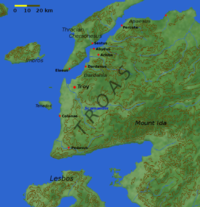Dardanians (Trojan)
From Wikipedia, the free encyclopedia
Jump to navigation Jump to search
This article is about the terms Dardan and Dardanian in classical writings. For the Shannara character, see Dardan (Shannara).
"Dardanoi, Trojan allies" redirects here. For The Balkan tribe, see Dardanii.

Amycus punished, red-figured Lucanian hydria, end of 4th century BC, Cabinet des Médailles. A prominent Trojan during the Trojan War
The Dardanoi (Greek: Δάρδανοι; its anglicized modern terms being Dardanians or Dardans) in classical writings were either the same people as, or a people closely related to, the Trojans, an ancient people of the Troad, located in northwestern Anatolia. The Dardanoi derived their name from Dardanus, the mythical founder of Dardania, an ancient city in the Troad. Rule of the Troad was divided between Dardania and Troy. Homer makes a clear distinction between the Trojans and the Dardanoi.[1]
Contents
Dardanoi and Trojans

Troas
The Royal House of Troy was also divided into two branches, that of the Dardanoi, and that of the Trojans (their city being called Troy, or sometimes Ilion/Ilium). The House of the Dardanoi (its members being the Dardanids, Greek: Δαρδανίδαι; Latin: Dardanidae[2]) was older than the House of Troy, but Troy later became more powerful. Aeneas is referred to in Virgil's Aeneid interchangeably as a Dardanian or as a Trojan, but strictly speaking, Aeneas was of the branch of the Dardanoi. Many rulers of Rome claimed descent from Aeneas and the Houses of Troy and Dardania. Homer adds the epithet Dardanid (Δαρδανίδης) to Priam and to other prominent characters denoting that they are members of the house of the Dardanoi.
Homer[3] writes;
The Dardanians were led by brave Aeneas, whom the fair Aphrodite, a goddess bedded with a mortal man, bore to Anchises in the mountains of Ida. He was not alone, for with him were the two sons of Antenor, Archilochus and Acamas, both skilled in all the arts of war.
The strait of the Dardanelles was named after the Dardanoi, who lived in the region.
Origins
The ethnic affinities of the Dardanoi, and of the Trojans, and the nature of their language remain a mystery. The remains of their material culture reveal close ties with Luwian,[4] other Anatolian[5] groups, and Thracians.[6] The Dardanoi were linked by ancient Greek and Roman writers with a people of the same name who lived in the Balkans (i.e. the Dardani), a notion supported by a number of parallel ethnic names found both in the Balkans and Anatolia that are considered too great to be a mere coincidence (e.g. Eneti and Enetoi, Bryges and Phryges, Moesians and Mysians).[7][8] Archaeological finds from the Troad dating back to the Chalcolithic period show striking affinity to archaeological finds known from the same era in Muntenia and Moldavia, and there are other traces which suggest close ties between the Troad and the Carpatho-Balkan region of Europe. Archaeologists in fact have stated that the styles of certain ceramic objects and bone figurines show that these objects were brought into the Troad by Carpatho-Danubian colonists; for example, certain ceramic objects have been shown to have Cucuteni origins.[9]
Variations of the name
Words used by Homer are:
- Dardaniōnes,[10] Δαρδανίωνες denotes Trojans in general
- Dardanioi, Δαρδάνιοι, same as above
- Dardanidai, Δαρδανίδαι, descendants of Dardanus; in Latin sometimes also used for Trojan women[11] in the Aeneid
- Dardanoi, Δάρδανοι, descendants of Dardanus, but also Trojan descendants of Assarakos[10]
See also
References
'Balkhans' 카테고리의 다른 글
| <펌>Aeneas (0) | 2021.06.04 |
|---|---|
| <펌>Dardani (0) | 2021.02.01 |
| <펌>Kingdom of Dardania (1) | 2021.02.01 |
| <펌>Byllis (0) | 2021.02.01 |
| <펌> Bylliones (0) | 2021.02.01 |